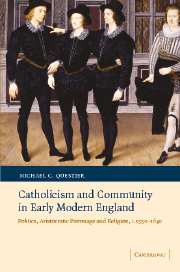 Catholicism and Community in Early Modern England
Catholicism and Community in Early Modern England Book contents
- Frontmatter
- Contents
- List of illustrations
- Preface
- Note on the text
- List of abbreviations
- 1 Introduction
- 2 The local setting
- 3 The emergence of a Catholic dynasty: the Brownes of Cowdray
- 4 The Brownes, Catholicism and politics until the Ridolfi plot
- 5 The Brownes, Catholicism and politics from the 1570s until the early 1590s
- 6 The entourage of the first Viscount Montague
- 7 A period of transition
- 8 The 1590s to the Gunpowder plot
- 9 Catholic politics and clerical culture after the accession of James Stuart
- 10 The household and circle of the second Viscount Montague
- 11 ‘Grand captain’ or ‘little lord’: the second Viscount Montague as Catholic leader
- 12 The later Jacobean and early Caroline period
- 13 The second Viscount Montague, his entourage and the approbation controversy
- 14 Catholicism, clientage networks and the debates of the 1630s
- 15 Epilogue: the civil war and after
- Appendix 1 The Brownes in town and country
- Appendix 2 The families of Browne, Dormer, Gage and Arundell
- Index
- Titles in the series
6 - The entourage of the first Viscount Montague
Published online by Cambridge University Press: 06 July 2010
- Frontmatter
- Contents
- List of illustrations
- Preface
- Note on the text
- List of abbreviations
- 1 Introduction
- 2 The local setting
- 3 The emergence of a Catholic dynasty: the Brownes of Cowdray
- 4 The Brownes, Catholicism and politics until the Ridolfi plot
- 5 The Brownes, Catholicism and politics from the 1570s until the early 1590s
- 6 The entourage of the first Viscount Montague
- 7 A period of transition
- 8 The 1590s to the Gunpowder plot
- 9 Catholic politics and clerical culture after the accession of James Stuart
- 10 The household and circle of the second Viscount Montague
- 11 ‘Grand captain’ or ‘little lord’: the second Viscount Montague as Catholic leader
- 12 The later Jacobean and early Caroline period
- 13 The second Viscount Montague, his entourage and the approbation controversy
- 14 Catholicism, clientage networks and the debates of the 1630s
- 15 Epilogue: the civil war and after
- Appendix 1 The Brownes in town and country
- Appendix 2 The families of Browne, Dormer, Gage and Arundell
- Index
- Titles in the series
Summary
THE FUNCTION OF THE ENTOURAGE
Recent research has emphasised, perhaps largely as we might expect, that the early modern aristocratic entourage tended to contain a variety of views and opinions. Its ideological tenor was not simply dictated from the top down by the great man or men at its centre. As we have already observed, John Bossy interprets the late Elizabethan and Jacobean earls of Worcester's Catholicism as the product of an environment in the borders of Wales which caused the earls to adopt a series of attitudes which, taken together, looked to contemporaries like Catholicism. Stuart Carroll has traced in minute and fascinating detail the workings of the institution of the family council which influenced the political decisions of the great men among the extended Guise family in sixteenth-century France. Carroll argues that even in the case of the Guise, frequently seen as the spearhead of an, above all else, ultra-Catholic reaction to the fragmentation of royal power during the Wars of Religion, the family's strategy was ‘primarily concerned with family interest and not blinded by devotion to family dogma’. For this reason they ‘protected their Calvinist kinsmen and employed Calvinist servants on their estates’. As Carroll emphasises, ‘at the core of an affinity the nobleman was surrounded by his most trusted friends, servants and kinsmen’. These were the people who ‘gave counsel and dominated the household’.
- Type
- Chapter
- Information
- Catholicism and Community in Early Modern EnglandPolitics, Aristocratic Patronage and Religion, c.1550–1640, pp. 181 - 206Publisher: Cambridge University PressPrint publication year: 2006


